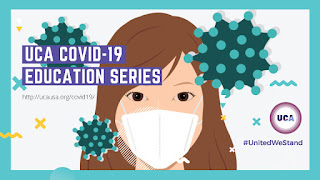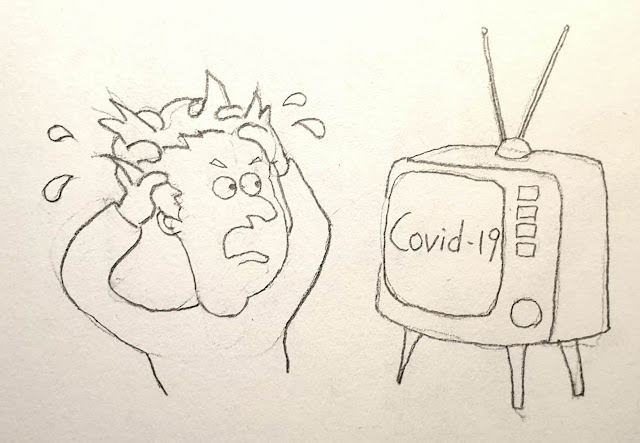51: Maintaining and Addressing Mental Health During the Pandemic
💁Tracy's Tips for maintaining and improving mental health during the COVID-19 pandemic
Warning: this article is very long and contain materials on different topics. Please take it in slowly and separate in different chunks.
During the pandemic, mental health may be affected in many ways. Psychological symptoms usually include: nervousness, anxiety, worry, fear, helplessness, being overwhelmed, depression, worry, anger, panic, mania, guilt, or feeling of being treated unfairly due to discrimination against certain group of people.
During the pandemic, mental health may be affected in many ways. Psychological symptoms usually include: nervousness, anxiety, worry, fear, helplessness, being overwhelmed, depression, worry, anger, panic, mania, guilt, or feeling of being treated unfairly due to discrimination against certain group of people.
Physiological symptoms usually include: headaches, stomachaches, loss of appetite, insomnia, nightmares, continuously feeling like crying, shortness of breath, heart palpitations (fast heartbeat), fatigue, general weakness, discomfort, etc.
Everyone experiences some degree of these stresses, in their own unique way. Biological and social-economic factors all have an impact on your own particular experiences. Regardless of these factors, common feelings share by a majority of people may include worry and anxiety, such as the fear of getting infected or losing family members, fear of loosing income, and stress caused by social isolation or quarantine. Some healthy degree of tension is actually necessary, to help you stay alert and pay attention. But over-reaction can be a problem and need to be attended.
You may experience psychological stresses in different stages:
- Anxiety from watching news and seeing people near you getting sick
- If you are infected, you may feel panic, depression, fear, and a feeling of being overwhelmed
- Gradually accept the reality and face them
- Become emotionally stable and rational (positive reaction); or on the contrary, anxiety and panic may be overwhelming which could lead to a sense of hopelessness, or other extreme feelings (negative reaction)
Types of psychological trauma caused by the outbreak:
- Indirect traumatic stress (Secondary Traumatic Stress): Generally appears in people on the front line (such as medical staff) or anyone who are witnessing and interacting with the sick, and thus, impacted by the sufferings of people around them;
- Acute Stress Reaction (Acute Stress Reaction): Sudden onset of extreme reactions, including any of the above mentioned physiological and psychological reactions;
- Post-traumatic stress disorder (PTSD): Re-occurring or recycling of these symptoms and reactions, after some time of the event, that can last for months or even years.
Grief and anxiety are typical expressions of these trauma, from seeing severe illness, suffering, and loss of loved ones, or even witnessing such traumatic experiences.
Whether it is indirect or direct psychological trauma, it needs to be acknowledged and addressed in a timely manner. Otherwise, continuous accumulation of trauma without proper relief will cause more serious psychological consequences.
Because each person's psychological experiences and feelings are different, their ability to cope and self-regulate are also different. It is better not to judge others and impose "should" and "should not" onto others.
At the same time, people who already have a psychological disorder or a history of such occurrences need to attend these conditions proactively so it will not be exacerbated by the existing situation of the pandemic.
Another important source that affects people's mental health is the media that is being constantly taken in, from reading, hearing, and seeing. "Information overload", which is the excessive and chaotic amount of information and social media posts, can have a significant negative effect on people's mind. In a sense, your mind constantly eats and digests "food" just as your stomach. If too much junk food and unhealthy substances are given to the mind, it will eventually become sick and fall apart. Learn to filter out mental garbage and reduce media intake is an important step towards maintaining mental health.
Helpful countermeasures to reduce stress and trauma during the pandemic
- Appropriate exercises, especially in a natural outdoor environment: exercise, sunlight, and nature are powerful mood regulators, such as jogging, hiking, bicycling, etc.
- Yoga and meditation practices: Learn how to relax and reduce stress, and ways to focus the mind such as through a mindful breathing exercise
- Adopt a new healthy hobby that helps your body move around and express your creativity: such as singing, dancing, gardening, camping, crafting, etc.
- Structured daily routine: regulate time on different activities can help improve sleep quality and ensure adequate rest
- Find positive, inspirational, and optimistic sources: try to stay away from negative and harmful thoughts, media posts, or conversations.
- Regulate and reduce information input (reduce the frequency, length and intensity of watching news, media and social media): be aware of the sources of your media intake (the "food" your mind takes in), and have a sense of discernment and balance, avoid letting unhealthy materials consume you.
- Caring for family and friends, as well as volunteering for your community: caring for others can help to broaden your perspectives and develop a sense of responsibility; volunteering can also bring more empathy and meaningfulness to what you do.
- Pull yourself away from negativity or unhealthy habits: practice and train yourself to become aware of your thoughts, mood, and behaviors; when you noticed you are falling into your old patterns, distract yourself by engaging in other activities and switch your mind to something else more healthy.
- Find a support group with family, friends or social circle: talk to others and find mutual support with people who share similar interest and concerns; expressing yourself by communicating with others is an effective way to release stress and trauma.
- Professional help: find reliable resources on mental health and psychological counseling, develop a habit of learning new materials for your benefit; seek professionals who can address your issues and support you.
How to communicate with children and maintain a healthy environment
- During the pandemic, most children can only stay at home. They cannot go outside whenever they want or visit a friend. Having to spend more time with parents and siblings may also lead to more stressful situations and conflicts.
- It would be the best adults can slow down and comfort their children with patience; Spend time explaining the situation in relatively simple language, encourage them to learn and discover answers for themselves;
- Do not assume children can understand easily from an adult’s viewpoint; Instead try to see the world from their perspectives; Avoid scolding them, accusing them to be wrong, stupid, or bad, and getting angry with them; Remember they cannot see what you see or know what's wrong or right, good or bad from your perspectives;
- It is ok for children to experience their own world, develop their own sense of judgement, by experimenting and exploring their own choices; Do not try to impose your own existing thought system upon them and force them to adopt yours (which can be a form of bully);
- When helping children develop good hygiene habits, be patient and do more than just demonstrate, give positive affirmation and encouragement for small improvements rather than reprimanding them if they do not do well.
- During this period, help children maintain a healthy life style and routine, avoid developing bad habits such as not sleeping on time, playing games for a long time, and eating irregularly. Parents need to be firm and consistent.
How to talk to anxious relatives and friends, or those with different opinions
- Learn to accept and listen, so that the other party has the opportunity to express themselves; everyone deserves to have their own feelings and opinions;
- Try to see the other side's perspective, consider their situation and their reasons for their feelings and opinions; everyone is "right" from their own perspective;
- If you have different opinions on current affairs or the current situation, state where you stand clearly without getting into unnecessary lengthy arguments or worse, angry attacks on those who don't agree with you;
- If you find yourself in an awkward situation, leave some room for others, respect their space, avoid acting like a psychologist try to analyze or treat others, as if they are abnormal;
- If you already have mental stress and unresolved conflicts that are intensified by the current situation, seek professional help or other support groups; a third-party's view may be helpful for you to unstuck from the situation;
- Give practical suggestions to relatives and friends, such as reliable resources to read, good movies, books, or meaningful measures that can be easily done and helpful to resolve the problems.
How to deal with workplace relationships during the pandemic
- Workplace relationships may take on a different angle as employers, employees, and co-workers are adjusting to new sets of circumstances, such as working from home, social isolation, and stress caused by economic impact;
- Stress caused by these rapid changes, uncertainty, and a sense of loosing control, is very common;
- Communicating with others in the workplace is the most important and the first step, so people can share their feelings and perspectives, and come up with solutions that can be agreed by the group;
- Be flexible and willing to adjust and adapt to different situations is a must;
- People with different personality trait can help each other see things and do things differently, which can then help release tension and personal attachment, and facilitate reaching a sense of balance and consensus building;
- The pandemics requires everyone to be the best of who they can be and what they can do; given the circumstances, what the group can accomplish depends in large how people can work together and be willing to support each other through the difficult time.
How to face discrimination and hatred due to prejudice and social bias
- The infected and their families may face prejudice and discrimination, because they may be seen as unclean, unhealthy, or causing problems to others;
- Xenophobia and racism can come up frequently as people from particular part of the world or belong to certain racial group (even if they have not grown up or traveled to the epicenters) may be seen as the cause of the problem;
- People who have such thoughts and feelings usually want to release their anger, find something to blame, intentionally or unintentionally "push" away others that they perceive as causing the problem or harm;
- What they don't realize is, by attacking others, it actually brings more harms to others who can be helpful and bring harms to themselves;
- COVID creates a unique set of challenges, because the virus is pervasive yet invisible; this makes it hard for people to release their stress and anger, but rather using the people from certain epicenters to be the surrogate for the virus itself;
- What can be helpful is to show people ways to release their grief, stress, and anger in a constructive and healthy ways, rather than to resort to harmful and destructive ways;
- It is also helpful for the victims of facing discrimination to speak up their experiences and feelings, and make the other side understand their perspectives;
- In case of serious threats and a hate crime, victims need to report to police and FBI, and seek professional help and assistance; communicate with support group, social circles, and organizations which provide such assistance will also be helpful;
- Resources of dealing with and defusing discriminatory acts can also be found from established organizations, such as American League of Deformation, American Civil Liberty Union, anti-hate-crime groups, organizations dealing with racism, organizations dealing with bullies, and many other such social groups and local organizations.
Resources:
- https://www.ptsd.va.gov/covid/index.asp
- https://www.psychiatry.org/patients-families
- https://www.apa.org/helpcenter/
- https://www.psychologytoday.com/us/blog/finding-new-home/202003/coronavirus-countering-your-fears
- https://exploringyourmind.com/seven-psychological-consequences-of-the-coronavirus-crisis/
- https://www.psychologytoday.com/us/blog/hope-resilience/202003/the-new-mental-health-research-coronavirus
Writing: Vicki Cheng, Helen Shih; Translation: Adelynne Chang; Proofreading: Helen Shih; Artwork: Sun Liu











